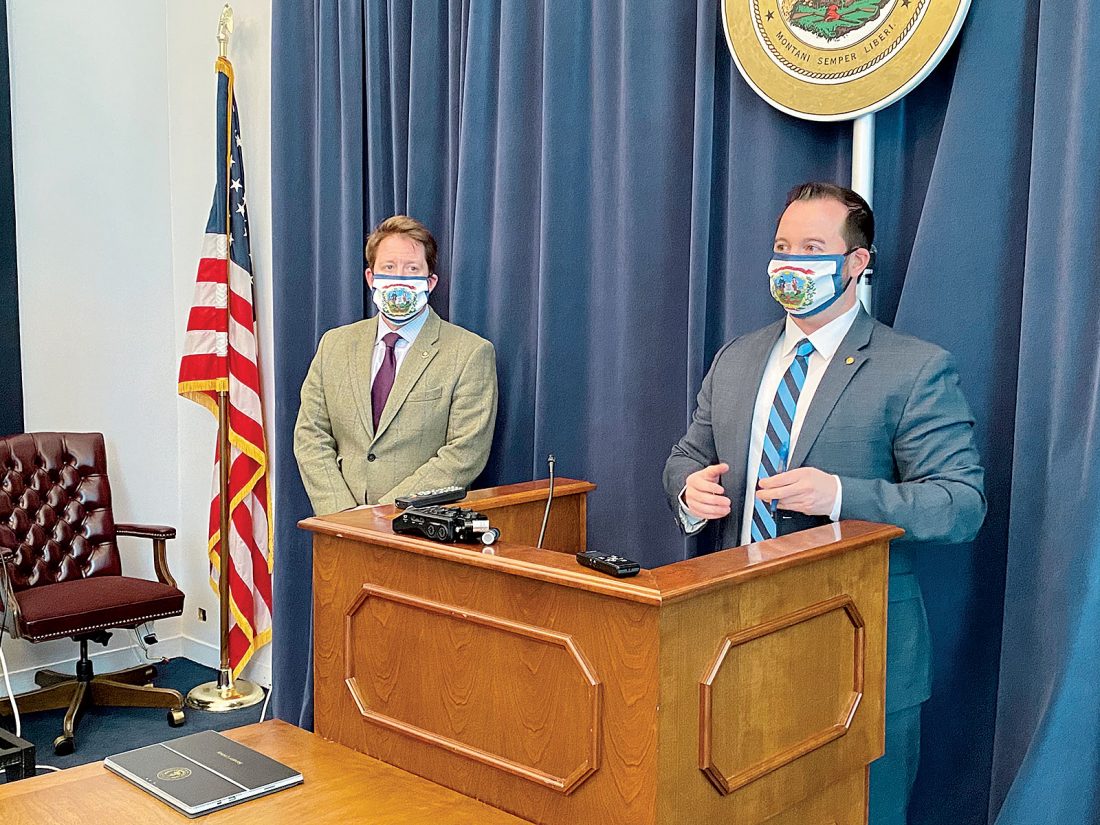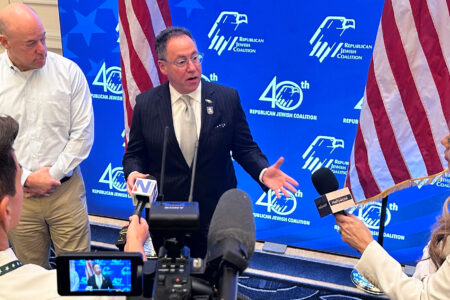Democrats criticize Justice State of the State proposals

Pictured from left, State Senate Richard Lindsay, D-Kanawha, and House Minority Whip Shawn Fluharty, D- Ohio, gave the Democratic Party response Thursday to Justice’s annual State of the State address Wednesday evening. (Photo by Steven Allen Adams)
CHARLESTON — Gov. Jim Justice came under fire Thursday from Democratic leaders in the West Virginia Senate and House of Delegates for his plans to phase out the personal income tax, his use of federal coronavirus aid, and for not talking more about broadband.
State Senate Richard Lindsay, D-Kanawha, and House Minority Whip Shawn Fluharty, D- Ohio, gave the Democratic Party response Thursday to Justice’s annual State of the State address Wednesday evening.
“What we heard (Wednesday) night was a shift in our priorities, one that prioritizes those who make the most money in this state, not those who are working the hardest necessarily,” Fluharty said.
“I do find it hard to believe that most West Virginians will see relief in their taxes based upon what (Justice) said (Wednesday) night,” Lindsay said.
Justice proposed a phase-out of the personal income tax, lowering the personal income tax by one-half for earners below a certain income and by one-third for residents above a certain income level with the future elimination of the personal income tax being the final goal.
Justice proposed creating a tiered severance tax for coal, oil, and natural gas; raising the consumer sales and use tax by 1.5 percent; increasing taxes on tobacco and soda; removing tax exemptions for professional services; creating a wealth tax; and making $25 million in cuts in state government in order to help ease the transition away from the personal income tax.
Justice called for the creation of a third Rainy Day Fund to help cover possible shortfalls as the personal income tax is phased out, using part of the remaining $665.1 million in federal C.A.R.E.S. Act left from the original $1.25 billion sent to the state last April for state and local coronavirus expenses.
Of that $665.1 million, approximately $400 million is being held back to pay off a $157 million interest-free loan through the U.S. Department of Labor to keep West Virginia’s unemployment trust fund solvent. West Virginia is one of 21 states with interest-free loans. The interest-free period extended to March 14.
Part of the $400 million would pay off that loan if the interest free period is not extended. The other part would replenish the state’s unemployment trust fund to avoid unemployment tax increases on employers. During a normal year the trust fund balance is around $200 million. Justice is also holding out hope that the $157 million debt will be forgiven by President Joe Biden’s Labor Department, freeing up those funds to place in the proposed third Rainy Day account.
“We’re getting the details now on why (Justice) has been sitting on this C.A.R.E.S. Act money — hundreds of millions of dollars designed to help our state and our people who have been hurting,” Fluharty said. “It turns out he wants to put it in one of his buckets to supplement tax breaks for the wealthy in the State of West Virginia.”
Democratic lawmakers, along with some Republicans, were critical of Justice’s handling of C.A.R.E.S. Act dollars, including trying to collect enough signatures from members to call themselves into special session to scrutinize Justice’s C.A.R.E.S. spending plans.
On Thursday, the House Finance Committee adopted an amendment to House Bill 2014 that would require the Governor to call in the Legislature for any expenditure of federal disaster funding more than $150 million during a declared state of emergency.
Lindsay noted that Justice barely mentioned anything about broadband expansion. According to a transcript of Wednesday’s State of the State, Justice only mentioned broadband four times.
“We made some really, really bold steps for broadband, did we not? West Virginia is deficit on broadband beyond belief,” Justice said. “We need to do any and everything we can to blanket our state with broadband. It will make us better and better and better, and the opportunities just abound everywhere. It is the next highway construction project. We absolutely have fed dollars now pouring in, and we have real progress in broadband.”
Prior to the November 2020 election, Republican lawmakers and candidates joined Justice on the steps of the State Capitol Building pledging to spend $150 million over three years for broadband expansion on top of other federal investments. Justice’s proposed fiscal year 2022 budget does not include a line item for additional broadband investment.
“When we about priorities … broadband is part of it. (Justice) said it’s part of it. And Democrats are committed to broadband,” Lindsay said. “That particular event before the election was eerily similar to the one where teachers were promised an increase in their pay … as you all remember, it took Democrats pulling Republicans kicking and screaming in order to do that. So I think it’s going to have to take us again to get broadband to work.”
“Broadband is about the only bipartisan issue you’re going to find down here, but we’re not getting many details of what (Justice) wants to do with it.” Fluharty added.
Steven Allen Adams can be reached at sadams@newsandsentinel.com






